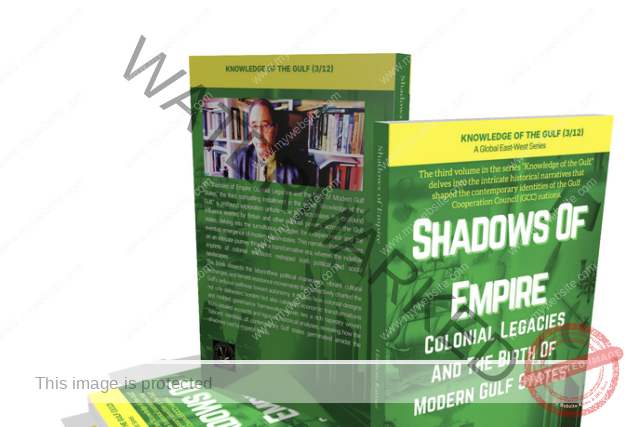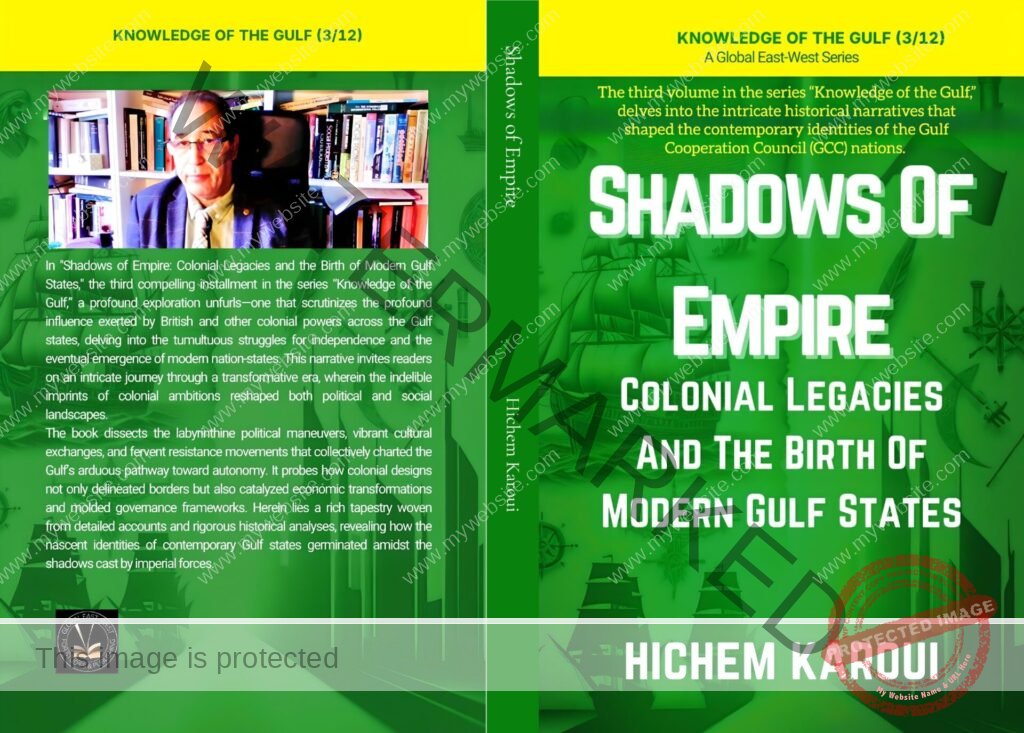Colonial Legacies and the Birth of Modern Gulf States
- Author: Hichem Karoui
- Publisher : Global East-West (London) (January 16, 2025)
- Series:KnowledgeoftheGulf (3/12)

- Language : English
- Hardcover : 320 pages
- Paperback : 320 pages
- Ebook
Introduction: A Post-Colonial Analysis of the Gulf Colonial Scene
Description of the Various Issues/Covered Areas
The cumulative subjects embedded in the overarching themes of this book not only tell the reader a story from one point in time to another but also deeply investigate the underlying factors that contributed to the historical developments of the region. The thematic aspects outlined in this book include, but are not limited to, colonialism, cultural exchanges, resistance, and nation-state formation – these are meticulously woven throughout the text such that each chapter becomes another element of the puzzle. In conjunction with the rest of the book, the study intends to cover a period extending beyond the events of the early 1900s and examine the overarching socio-political phenomena with greater sensitivity and clarity. The chapter on the colonial footprints of the region seeks to answer questions regarding the first contact of imperial powers with the area, in preparation for later discussions of state building, reorganisation of the economic systems, and the inventions and interventions of the time. A fine melting pot of cultural boundaries spans the lives and stories of various peoples, igniting revisionist ideas and challenging negative stereotypes about history. Along with these narratives, which restructured the existing social fabric of society, are accounts of secession, rebellion, revolt, and conquest – navigating through dependency towards sovereign selfhood. Moreover, the geo-strategic interests and imperial entanglements of that period are examined here as well, particularly when attempting to reconstruct the events of that time.
While this book emphasises and evaluates the relevant historical events, it also encourages readers to reflect on the legacies those events left in the world today. There is also clear multidimensionality and overlap among these themes, which assist in answering the book’s questions and helping readers to better understand the history of a particular region.
Historical Context and Significance
Interpreting the region and its history, the chronology has undergone essential changes (mainly social). From the very first societal developments, where self-governed tribes traded with the colonisers, to the conquering and settling by foreign powers, there have been alterations. That rich event-driven cultural interaction and internal spread influenced the region’s past and laid the fundamental features for its present. The history described here is not simply a series of independent events in chronological order; rather, it links into combined events that shook the world in a manner that has impacted the contemporary world.
Furthermore, the relevance of this historical context, in addition to being part of a story or academic review, provides a platform from which the alchemy of political, economic, social, and cultural systems can be viewed. Through such insight, the historical context offers wisdom on the root causes of certain present-day challenges or opportunities. Appreciating historical significance enables one to recognise the ingenuity and fortitude of people who lived in challenging eras and shaped legacies that still influence civilisation today.
Within the convergence of many civilisations and cultures, the historical context of the region encompasses power structures, ideological movements, and the development of commerce. These narratives are interconnected, as are the interactions between people and environments, along with supporting factors. Different cultures and societies within the region are shaped by these memories that originate from various interactions and relationships among these diverse societies.
In other words, the past interplay of elements with the present can be understood in relation to historical context and significance, and how the present is shaped. This journey takes into account the interconnectedness of local and global histories, in such a way that time is not distinctly bounded – events and occurrences are global and intergenerational. Against this backdrop, we embark on a captivating voyage with the goal of comprehending the intricate and interwoven threads of human experience, exploring life in all its depths through the study of history.
Significance of this Study and its Goals
Having delved into the multifaceted relationships between history and society, it is pivotal to specify the purpose and objectives of this research project. The main focus of the research is to account for the intersection of colonialism with state development, cultural interactions, and other global processes within the historical context of the area. The purpose of this research is to provide a contextualised analysis aimed at revealing new layers of complex historical processes. In addition, it is necessary to investigate the persistence of certain elements from past empires and wars in contemporary society, linking the past with the present. In tackling this challenge, the authors seek to address the problem of subverting the normative understanding of agency, power, and history, with a special focus on local voices, motivations, and the actions of the wider society, as well as subaltern and grassroots groups. Furthermore, it aims to contribute to the existing body of knowledge by providing informed critiques, engaging in interdisciplinary discussions, and fostering a more integrated understanding of history. The construction of an inclusive and multi-faceted historical landscape, free from traditional Eurocentric or ethnocentric lenses, remains at the heart of the project.
The narrative strives to present the reader with a myriad of human experiences by delving into their emotions, pasts, and perspectives, thereby engaging the reader’s attention. Within the goals of this study, the aim is to shed light on the past and encourage the reader to think differently and assess the historical events of that time.
Research Design and Conceptual Framework
It is important to have a proper model and method of analysis to make sense of the specific historical context that we are about to investigate. The framework developed forms the conceptual basis of this study, which theoretically guides the interpretation and analysis of the colonial history of the region in question. This framework is functional in nature and relies on relevant disciplines such as history, sociology, anthropology, geography, political science, and others in its completeness. Such an approach is important as it combines multiple experiences with colonialism and traces its effects and numerous consequences.
In methodological terms, our strategy employs qualitative methods that allow for acquiring information concerning hidden codes, comparing different sources, and identifying patterns and trends. Our core areas of investigation typically include documentary and ethnographic research, life stories, and oral texts, which enable us to reconstruct a sociology of historical accounts that explain the relationships and nuances of colonialism. Furthermore, these two different aspects of the colonial experience enable us to see the relationship between different periods in history and the necessity for a different perspective without the constraints of time. Therefore, our methodology also adopts a longitudinal perspective, examining temporal continuities, ruptures, and changes, with a focus on the global context of colonialism.
This overarching strategy enhances our understanding of the historical processes of various countries and regions, alongside specific events. By employing different tools, we attempt to explain the complex relationship between people and space, and to illustrate how the cultures of colonial rule were shaped. Our approaches reflect such details effectively, as the methodology employed is integrative and straightforward; the colonial history we are concerned with is researchable in a profound way by anyone interested in studying the remnants of empire.
The Role Geography Plays in Events in History – Context and Changes in Society
Geographical conditions are essential for understanding the intricacies of historical evolution. It is paramount to acknowledge the significant influence geography has had on the historical, political, socio-economic, and cultural constructions of regions at all points in history. The natural features of an area, such as landscape, climate, and resources, have not only shaped the livelihoods of its people but also altered the actions and decisions of key figures in history. From expansive dry deserts posing barriers to trade and communication, to vast river networks facilitating commerce, geography has significantly influenced the destinies of countries. Additionally, the courses and area-specific targeting of conquests, wars, and alliances have sometimes depended on the geographical location of territories. For example, historical events have been influenced by geography in the form of strong mountain ranges acting as natural barriers, or large flat lands permitting faster military operations. Resources like cropland, minerals, and water have historically defined the strength and resources of civilisations as a whole.
The importance of geographical settings extends beyond mere physical features to encompass socio-cultural aspects as well. Human interaction with the environment has generated diverse cultures, customs, and worldviews with geo-spatial ties. Moreover, the ways communities relate to their surroundings affect their identity and history. The interaction of historical events with geography is crucial, as this helps us understand the processes and factors approaching the crossroads of humanity. Such inquiries will illuminate the underlying causes of historical processes by examining centres of power, trade hubs, and the migratory movements of various societies. Through these means, we can comprehend the intricate sequences of historical events and the meaningful connections that exist between the development of human civilisations and global occurrences.
Introduction to the Periodic History Under Study
While tracing the historical evolution of our area of study, we embark on an exploration of a rich spectrum of epochs that have significantly contributed to the region. To begin with, the British imperial expansion provides a context for when other powers started to establish themselves and their influence in society, focusing on those very beginnings. This is followed by the establishment of territories, where crucial episodes in the geopolitical architecture concerning the emergence of states and the construction of borders are all considered. During this process, we attempt to trace the boundaries connecting the stories of distinct societies, boundaries that are buried within the context of larger questions. The process does not end there; we transition into the significant cultural interchange with the aim of grasping the region’s deep cultural complexities by integrating the influences and interactions that contribute to the vast cultural diversity of the area. Furthermore, against the backdrop of market developments, we observe the shift from a pearl-based economy to an oil-dominated modernity, highlighting some of the underlying forces that have shaped the region’s direction. Additionally, we aim to reveal further layers of understanding of the region by exposing the complex systems that link people and groups across borders.
To start, we concentrate on the intricacies of imperial politics within the framework of the power struggles of colonisation. Simultaneously, we examine the opposing narratives of imperial rule and local leadership, as well as movements that fought against it. Concluding with an examination of insurrection, rebellion, and the revolution for independence, the account details the wars and negotiations of the time. In that order, we explore the impacts of globalisation and the period when the world started developing anew, ultimately reflecting on the empire and its ongoing influence on nation-building today. All of these topics enable us to present a comprehensive picture of the historical periods and to cultivate a responsible understanding of the challenges that have shaped contemporary reality.
Key Historical Figures and Events
As demonstrated in this book, the timelines and histories of the regions are intertwined with remarkable individuals and events that have contributed to their overall history. From great figures who shaped the Arab-Islamic empire in previous centuries to significant events that changed the course of history, these elements are deeply interlinked.
The powerful leaders across multiple realms are central to this narrative, as their legacies transcend time. The rulers who directed empires like architects, and the reformers who navigated through turbulence, these politically astute individuals contributed to diversifying the destinies of the empires and the peoples over whom they presided. The memories of societal civilisations were enriched by great victories, exceptional diplomacy, and effective cultural exchange.
Moreover, the global integration of the world was marked by historical events that transformed everything. The demise of empires, treaties, wars, and revolutions paved the way for significant political, social, and economic changes for regions and countries; this integration profoundly influenced history and the narratives that followed. The pivotal moments leading to societal transformations define everything, redirect political geography, and open avenues for future growth that were once unimaginable.
While encountering modern-day society, imperial rule began with the reign of empires and gradually transitioned into contemporary colonialism. With this shift came influential figures along with moments that irrevocably changed empires. Understanding history without comprehending its context is futile; thus, the pillars supporting history emerged during this transformative period.
Key Terms and Definitions
To understand the socio-historical context, it is necessary to define clear terms. These help navigate the complicated elements of historical processes, movements, and transformations that are being described.
The term that stands out is ‘colonisation’, which is quite broad and encompasses everything related to the takeover of foreign lands, inherently involving the relocation and occupation of that territory by a new dominant culture. This process often entails the takeover of political, economic, and social power, with long-lasting consequences for the affected territories and future societies.
Another term worth mentioning is ‘imperialism’, which refers to the policy or practice of a nation attempting to control or rule over other countries or peoples, frequently ensuring continuous colonial rule and expansion of territories through military force or diplomatic means. This concept has continued to play decisive roles in global affairs and the balance of power.
Within the framework of the study, attention should also be given to the concept of ‘nationalism’. Nationalism is a political principle that focuses on the nation and aims at either creating or maintaining a sovereign state, typically for a particular ethnic or cultural group. Nationalism and its changes are quite descriptive of independence movements and resistance against foreign domination.
Furthermore, ‘globalisation’ is a hallmark of the present day, characterised by the growing interdependence of economies, societies, and cultures in a profoundly diverse sense. This complex phenomenon is essential for examining post-colonialism, economic development, and changes in world politics.
The term ‘sovereignty’ is crucial for many historical controversies and wars, referring to the highest power of a state over its territory and its freedom from outside control. Considering the disputes and transformations around the concept of sovereignty during different periods reveals regularities in the development of geopolitics and diplomacy.
Lastly, ‘decolonisation’ refers to the ending of colonial relationships and the dismantling of the colonial structure, usually involving efforts toward self-determination and the establishment of free states. The scope of decolonisation encompasses difficult negotiations, revolutions, and the global consequences of the anti-colonial struggle.
The terms defined in this context create a basic framework through which we can traverse different historical settings that will be described in this book. In subsequent chapters, these concepts will act as the foundation of our analysis, clarifying the intricate fabric of historical change and preservation, thereby enabling us to delve deeper into the narratives that intertwine with the contemporary world.
Structure of the Book
In this comprehensive exploration, the book has been meticulously structured to navigate the intricate tapestry of historical events, cultural exchanges, economic transformations, and geopolitical shifts that have defined the region’s journey from colonialism to independence and beyond. The book is divided into several distinct sections, each addressing critical aspects of this multifaceted history. This structure aims to provide readers with a coherent framework for understanding the complex dynamics at play within the interconnected narratives.
The opening chapter, “Colonial Footprints: The Arrival of British and Other Powers,” unravels the early encounters and impacts of colonial powers on the region. This is followed by “Forging Frontiers,” which dissects the processes of territorial expansion and border demarcation, illuminating the power struggles and alliances that shaped the political and geographical landscape. These chapters establish a foundational groundwork for further exploration.
Continuing from this foundation, “Mapping the Sands: Border Making and State Formation” delves into the intricate mechanisms of state formation and border definition, providing insights into the complexities of governance and sovereignty. The narrative then progresses into “Invisible Threads: Uncovering Hidden Connections,” unveiling the often-overlooked networks that transcended boundaries and influenced socio-cultural dynamics and power structures. This thematic shift offers a compelling perspective on the region’s interconnected histories and relationships.
Subsequent chapters, such as “Cultural Crossroads: Exchanges and Influences” and “New Perspectives: Unveiling Forgotten Narratives,” explore the rich tapestry of cultural interactions and revisit untold stories, highlighting resilience and adaptation amid changing paradigms. Simultaneously, “Economic Tides: From Pearls to Oil” examines shifts in economic exploitation and transformation, presenting an in-depth analysis of the region’s economic evolution.
Additionally, the book includes sections examining “Strategic Interests: The Geopolitics of Colonisation” and “Imperial Intrigues,” which provide a deeper understanding of the strategic manoeuvres and global influences underlying colonial ambitions. Furthermore, “Voices of Resistance: Local Leaders and Movements” and “Rebellion and Revolt” shed light on various forms of nationalist resistance and uprisings against colonial oppression, offering a comprehensive portrayal of dissent and agency.
As the narrative unfolds, “Road to Independence: Conflicts and Negotiations” elucidates the tumultuous path toward self-determination, capturing the key moments and negotiations that led to independence. Following this, “Challenges of Globalisation” critically examines the impacts of globalisation on the region, navigating the tensions and opportunities presented by an increasingly interconnected world. Through “Legacy of Empire: Modern Nation-State Building,” the book concludes by evaluating the enduring influences of empire and the complexities of nation-building in a post-colonial context, linking historical paths to present realities.
Each section is meticulously researched and articulated, aiming to engage readers in a profound exploration of the region’s historical odyssey.
EXCERPTS






MOST COMMENTED
Gulf / Geopolitics / GEW Intelligence Unit / MENA Matters / International Relations / Book Release / Current Affairs
The Strait of Hormuz Gambit by by Hichem Karoui With GEW Intelligence Unit
International Relations / Iran / Gulf / Geopolitics / Global East-West Bulletin / Global and International / GEW Reports & Analyses Collection: Resistances / Israel / Analyses & Commentaries / Current Affairs / Research / Research Paper
La Dynamique Géopolitique au Moyen-Orient: Entre Instrumentalisation des Divisions, Antisionisme Iranien et Expansionnisme Israélien
Economy and Development / Analyses & Commentaries / Current Affairs / Economy / Briefings and Reports
Iran’s Economy Post-War
Essays / International Relations / Book Release / Current Affairs / Podcast / Gulf / Our Books
The Gulf and the War Against Iran
Gulf / Diplomacy / International Relations / Analyses & Commentaries / Current Affairs
Prince Turki Al Faisal: Unlike other western leaders, Mr Trump should not follow double standards
Analyses & Commentaries / Current Affairs / International Relations / Briefings and Reports / MENA Matters
Peace Through Strength or Path to Isolation? A Comprehensive Analysis of Contemporary Coercive Diplomacy and Historical Parallels
USA / Iran / Gulf / MENA Matters / Israel / Analyses & Commentaries / Current Affairs / GEW Assessment Report
The Battle Over Truth: Analyzing Conflicting Narratives on US Strikes Against Iranian Nuclear Facilities